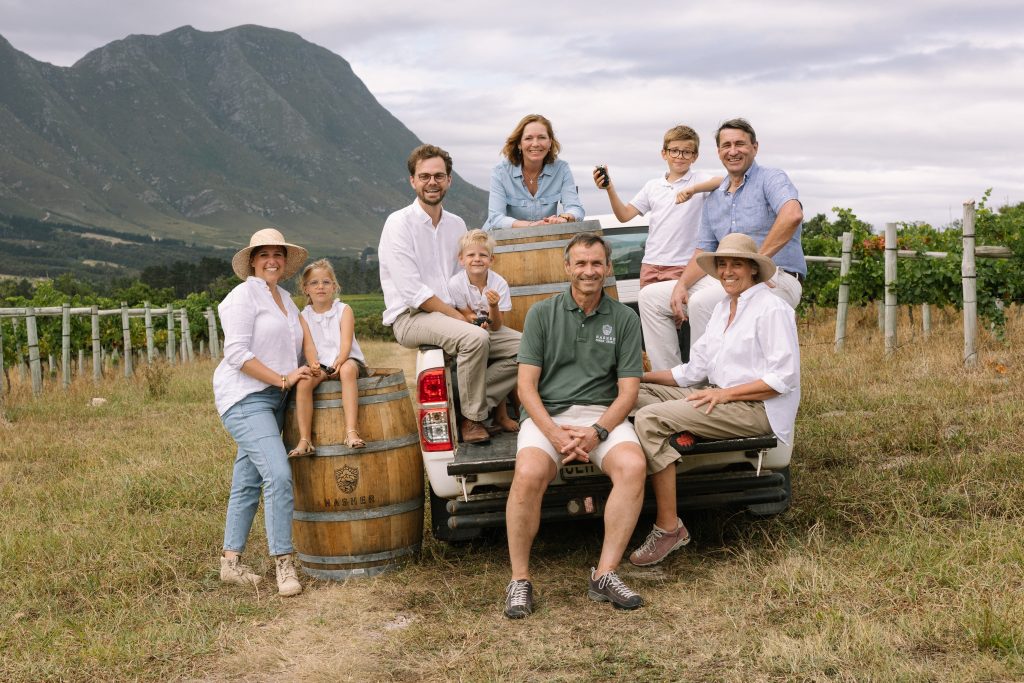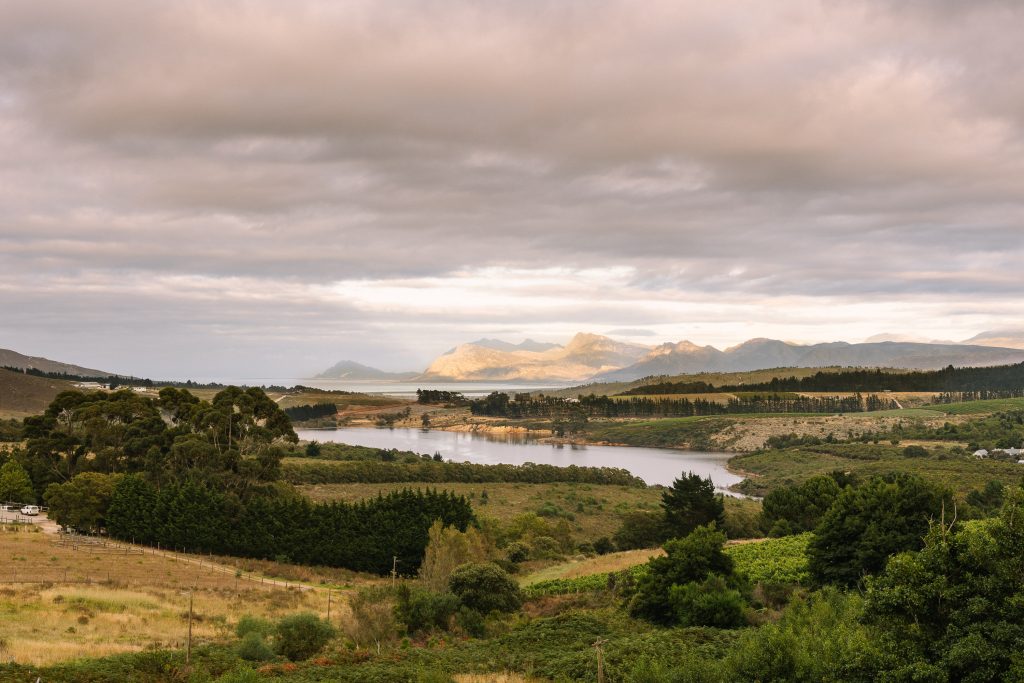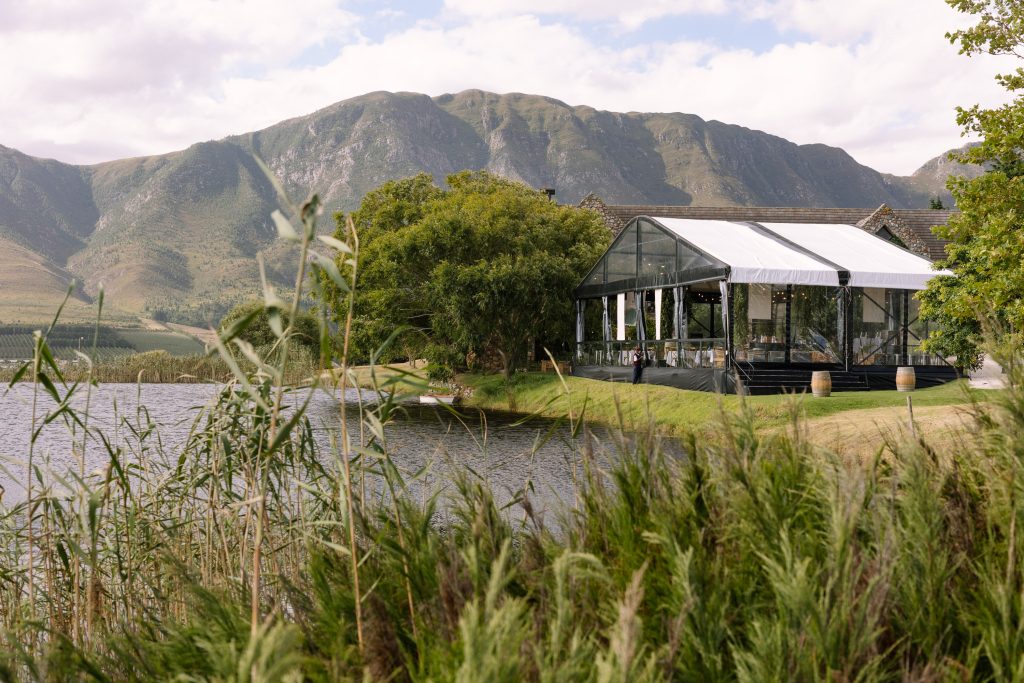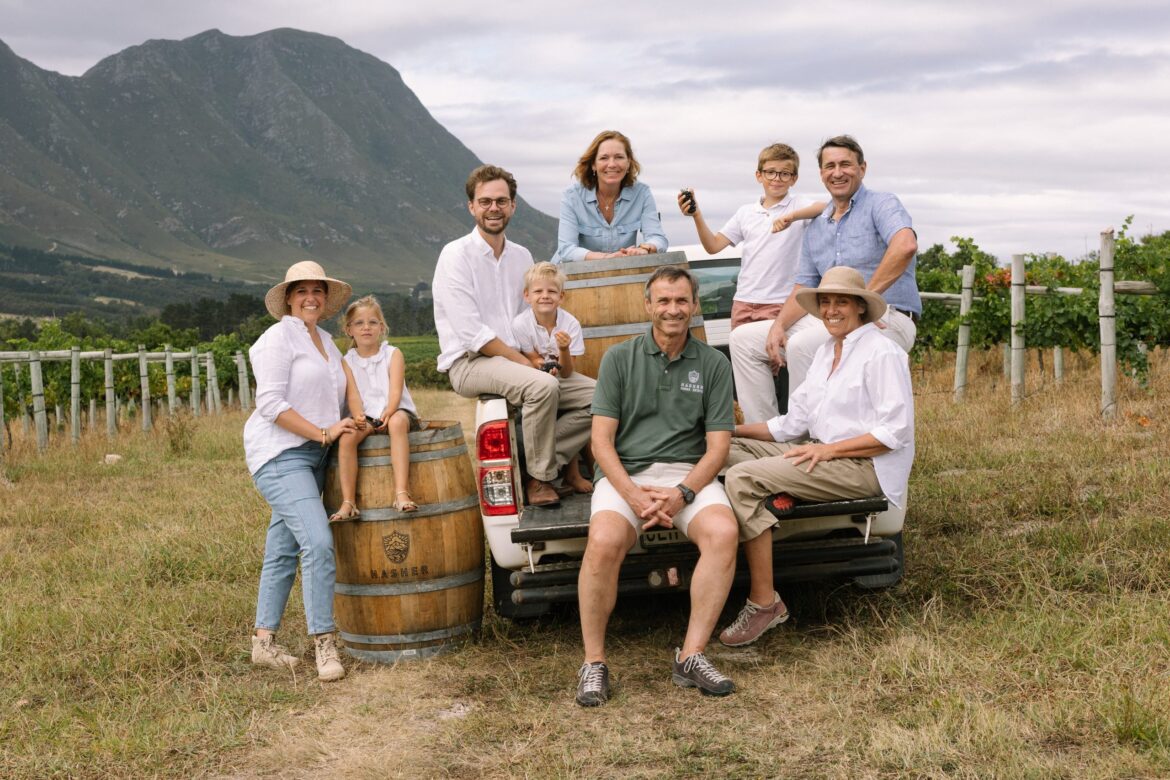Frederik Herten and Céline Haspeslagh took a bold move in 2021, moving their family from Belgium to South Africa. Yet, in just four years, Hasher Family Wines has moved from continental relocation to global recognition.
 The family, including Céline (left) and Frederik (third left).
The family, including Céline (left) and Frederik (third left).
Belgium is known for its alcohol: it is, undeniably, a global leader in the beer scene. But its wines? It is fair to say that Belgium is yet to emerge as a viticultural behemoth.
At least one family, however, is demonstrating the nation’s winemaking aptitude. All it took was a bold step and a substantial migration.
Frederik Herten and Céline Haspeslagh, made the leap in 2021, bringing with them three children and a bold plan to make wine. They, along with Céline’s uncle Xavier Haspeslagh and his wife Christine Bouckaert, acquired a 180 hectare property in South Africa’s Hemel-en-Aarde region to become Hasher Family Wines.
It may sound like a mad move, but the foundations were laid long ago. Frederik had fallen in love with the area on visiting Hermanus as a child, and Céline shared his enthusiasm when they first visited together in 2008.
Moreover, they each had fallen in love with wine. Céline fondly remembers making wines with family and friends as a child, while Frederik discovered Ribera del Duero as a student and never looked back.
The project of Hasher Family Wines was therefore always personal. The pair are intensely involved, from the vineyard to the bottle, but are now joined by a close-knit team of extended ‘family’. That includes Natasha Williams, the winemaker, who fell in love with the Cape’s natural beauty growing up by the Tulbagh mountains. And, of course, it also includes Rafiki and Simba, the winery’s resident mutts.
The personal touch is evident throughout the winery’s work. You see it, for instance, in the wines’ names, each telling a story of family or place. Nauticus Sauvignon Blanc acknowledges the local storms blowing in off the ocean. Cyriel Cabernet Franc pays homage to the old family name. Ernest Pinot Noir, quite simply and sweetly, is named for Frederik and Céline’s firstborn son.
You should not, however, mistake personal for amateur. Even in such a short span, Hasher Family Wines has gained international recognition, with accolades such as a Master medal at The Drinks Business Autumn Tasting. As a new company on the South African wine scene, it is evidently one to watch.
A central philosophy
The family’s success is, in no small part, due to the clarity of the vision. Not only does this explain the decision to move thousands of kilometres away, but it also is clear in Hasher Family Wines’ approach to viticulture and winemaking.
Firstly, the owners recognised where to focus their efforts. Situated just five miles from the Southern Ocean, Hasher Family Wines’ vineyards benefit from its cooling influence. That cool climate position is further accentuated by the local soils: granite provides micro-nutrients, but the clay base keeps the vineyards cool.
The northwest aspect of the slopes, however, mean that the vines intercept a lot of sunlight. This is both ideal for ripening and creates a wide diurnal range, adding freshness to the fruit.
 From the cellar, you can spy the ocean.
From the cellar, you can spy the ocean.
Such aination of coolness and optimal ripeness guided the family team to two grapes: Chardonnay and Pinot Noir. Other big hitters from the world of South African wine – namely Sauvignon Blanc and Pinotage – also feature, as does Cabernet Franc, but the cool climate Burgundy varieties predominate.
Indeed, as Frederik and Céline plant up more of the farm, they represent the bulk of new plantings. The aim is to work with the land in planting choices, not against it.
Such an attitude – you might think of it as getting out of the way wherever possible – carries through to viticulture and vinification. As Williams explains: “Our role is to guide nature gently, allowing it to do what it does best while we provide subtle interventions when necessary.”
In practice, that means a regenerative approach in the vineyards. Careful pruning and the use of organic fertiliser and composting have minimised synthetic inputs, while cover crops, predator bugs and livestock in the vineyards have promoted biodiversity. The overriding belief is that nature, when nurtured, can do much to look after itself.
Likewise, in the winery, there is no intervention for intervention’s sake. Although French oak features throughout the range, it is seen as a vessel rather than a flavour, and both batonnage and overextraction are avoided to preserve the grapes’ character.
Space for further growth
As such a young project, you might expect Hasher Family Wines to take it steady from here. Not so, it seems: Frederik, Céline and their team have plenty to keep them busy.
The new vineyards are developing apace, with 16ha now planted. That will more than double the area under vine as the plants slowly reach their maturity.
As for the rest of the estate, a sizeable chunk has been dedicated to conservation. One third of the estate – some 60ha – is being preserved as a haven for biodiversity as part of the WWF Conservation Champion programme.
That means protecting the local fynbos landscape, a local biome unique to the Cape. On Hasher Wine Farms’ land alone, there are 15 species of conservation concern whose habitats will be conserved. Indeed, such is the team’s love of local biodiversity, that it named the Batrachella Pinotage after Microbatrachella capensis, a local, critically-endangered species of frog.
For the farm’s human residents, there are also grand plans. The winery already has a fully-fledged wine tourism operation, offering wine and nibbles in a homely setting and picnics to enjoy the wines in the natural beauty of the Cape.
 The estate offers ample space for events and entertaining.
The estate offers ample space for events and entertaining.
Moreover, from December to January, it will play host to Epoché, a fine dining pop-up. Chefs Edwin and Tom Vinke, known for Michelin-starred restaurant De Kromme Watergang in the Netherlands, will present a 15-course meal in an intimate setting.
There is, it seems, no stopping at Hasher Family Wines. In just four years, it has earned a reputation for its cool-climate wines and blended the best of both innovation and heritage. With the company bedding in – not to mention the new vineyards literally taking root – the family is more than ready for the next four, and beyond.
Patricia Stefanowicz MW tasted the Ernest Pinot Noir at The Drinks Business Autumn Tasting, where it secured a Master medal, the highest category of award.
Hasher Family Wines Ernest 2023

Producer: Hasher Family Wines
Region: Upper Hemel & Aarde Valley
Country: South Africa
Grape variety: 100% Pinot Noir
ABV: 12.6%
Medium cherry-coloured with a garnet rim showing some development, the wine is packed with red cherry, pomegranate and cranberry fruit, accented with tobacco and milk chocolate, and red roses and violets. The mid-weight palate is concentrated yet perfumed and elegant, with very lively acidity and velvet-textured tannins. Mouthwatering on the finish. An excellent-value wine that will match spiced rôtisserie chicken.
Related news
Why Monastrell is ‘deserving of greater fame and awareness’
67 Pall Mall reveals the changing face of fine wine demand
Lenz Moser: ‘The wine industry needs an iPhone moment’


Dining and Cooking